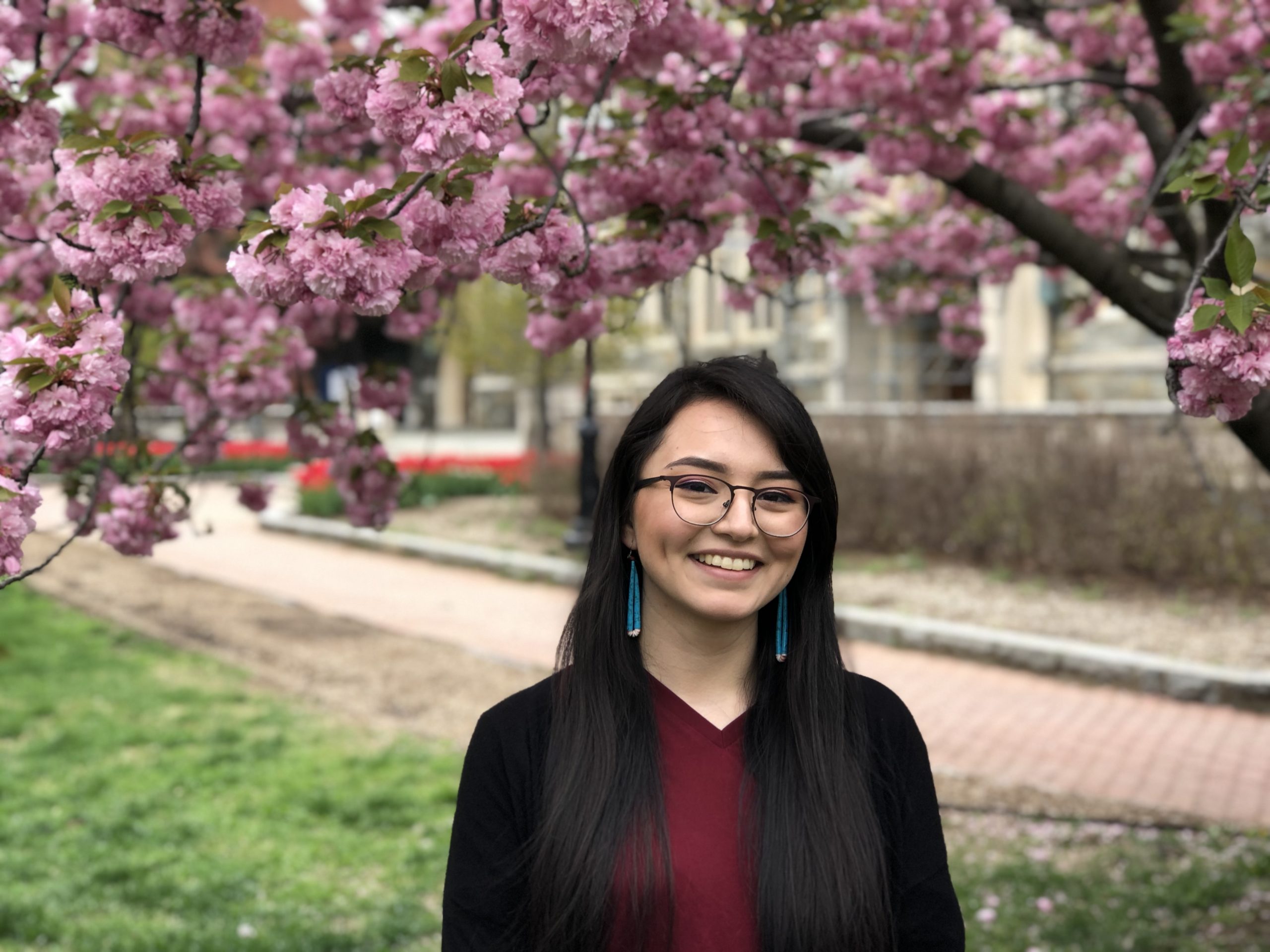Human Science Junior Receives Udall Undergraduate Scholarship
May 2, 2019 – Yasmin Zuch (NHS’20), who is majoring in human science at the School of Nursing & Health Studies, has received a Udall Undergraduate Scholarship to pursue her interest in improving health and well-being for Native Americans.
Zuch, who is from Arizona, will receive $7,000, participate in the Udall Foundation’s five-day orientation program this coming August, and be able to network with program alumni, fellow scholars, and “professionals working on environmental and tribal issues.” At Georgetown, the aspiring physician is active as a leader with the Native American Student Council.
Question: Tell us a little bit more about yourself.
Zuch: In the city of Flagstaff, Arizona, I lived two blocks away from the hospital I was born at on a hill aptly titled Hospital Hill. Growing up, I often visited my father’s workplace within the hospital, and through my father, I was continuously exposed to the health care system. For some of my elementary years, my mother, brother, and I commuted to the school she taught at in Tuba City, Arizona, on the Native American reservation. During this time of my life, I had the most exposure to my Navajo and Tewa culture and heritage, but also saw what health disparities existed in these populations.
I enjoyed many subjects within the natural sciences, but I always gravitated towards human biology. I saw beauty in its complexity and wanted to enrich my understanding. My father suggested that I look into applying to Georgetown University. When I was researching GU, I was immediately attracted to the human science program, its level of attention, and the courses dedicated to human health and biology. I realized how in tune I was with the major’s practicality for students pursuing medical school, and it was at this moment I committed to the idea of becoming a future physician. I applied and received my letter of admission. The rest is history!
Question: What drew you to apply to the Udall Undergraduate Scholarship program?
Zuch: I was fortunately contacted by Laura Perille at the Office of Fellowships, Awards, and Resources about the Udall scholarship. The scholarship awards undergraduate sophomores and juniors dedicated to issues related to the environment, Native health care, and tribal policy. The latter two require the applicant to be Native American or Alaska Native, and because I was already pursuing an occupation in the medical field, I felt that I would be a competitive candidate. What was especially compelling for me was the national recognition of Native American students who are fighting to improve tribal communities. I believe many issues that impact Native societies have largely gone unnoticed, yet the Udall scholarship supports Native students with the education and necessary resources to address these issues. For these reasons, I believe the Udall scholarship has an amazing and noble mission.
Question: What have you been involved in on campus?
Zuch: Over the last two years, I have been actively involved in the Native American Student Council as its treasurer and vice president. Recently, we have been advocating for more indigenous acknowledgment by the university in supporting current and recruiting future indigenous students. To help raise awareness about these visibility issues, I helped write and circulate our petition that outlines what specific changes we want to see on campus to support the university’s Indigenous population. Aside from this advocacy, I help in planning cultural and educational events showcasing indigenous heritage.
Question: How have you enjoyed the human science major?
Zuch: I truly believe that there is no better major for me. The human science program has been a perfect blend of research, scientific communication, biology, and community health. The major has been a great introduction to what challenges and opportunities exist in the health care field, and the program has also adequately prepared me for them. Additionally, I am extremely grateful to be surrounded by wonderful opportunities and resources, as well as colleagues and faculty within the Department of Human Science who want to see me succeed. Certainly, the program doubles as a source of community, and I have always felt welcomed and motivated by those around me.
Question: What do you hope to do after Georgetown?
Zuch: Upon graduation, I plan to pursue a master’s degree in public health with a focus in health promotion at Northern Arizona University, where I will complete the indigenous health track. I then plan on obtaining my medical degree from the University of Arizona’s College of Medicine and continuing my residency program in Arizona. Because of the high population of Natives in and around Arizona, I want to continue my education in my home state to engage more deeply with the Native health care system and the health problems that are the most prevalent on the reservations.
Editor’s Note: More About the Program and Foundation
“Fifty-five students from 50 colleges and universities have been selected as 2019 Udall Scholars. A 14-member independent review committee selected this year’s group of Udall Scholars on the basis of commitment to careers in the environment, Native health care, or Tribal public policy; leadership potential; record of public service; and academic achievement. The review committee also awarded 55 Honorable Mentions. Each scholarship provides up to $7,000 for the Scholar’s junior or senior year. Since the first awards in 1996, the Udall Foundation has awarded 1,678 scholarships totaling $8,475,000.
“Established by Congress in 1992, the Udall Foundation awards scholarships, fellowships, and internships for study in fields related to the environment and to Native Americans and Alaska Natives in fields related to health care and Tribal public policy; provides funding to the Udall Center for Studies in Public Policy to conduct policy research and outreach on the environment and related themes and to the Native Nations Institute for research, education, and outreach on Native American and Alaska Native health care issues and Tribal public policy issues; and provides assessment, mediation, training and other related services through the U.S. Institute for Environmental Conflict Resolution.”
- Tagged
- hoyas2020

